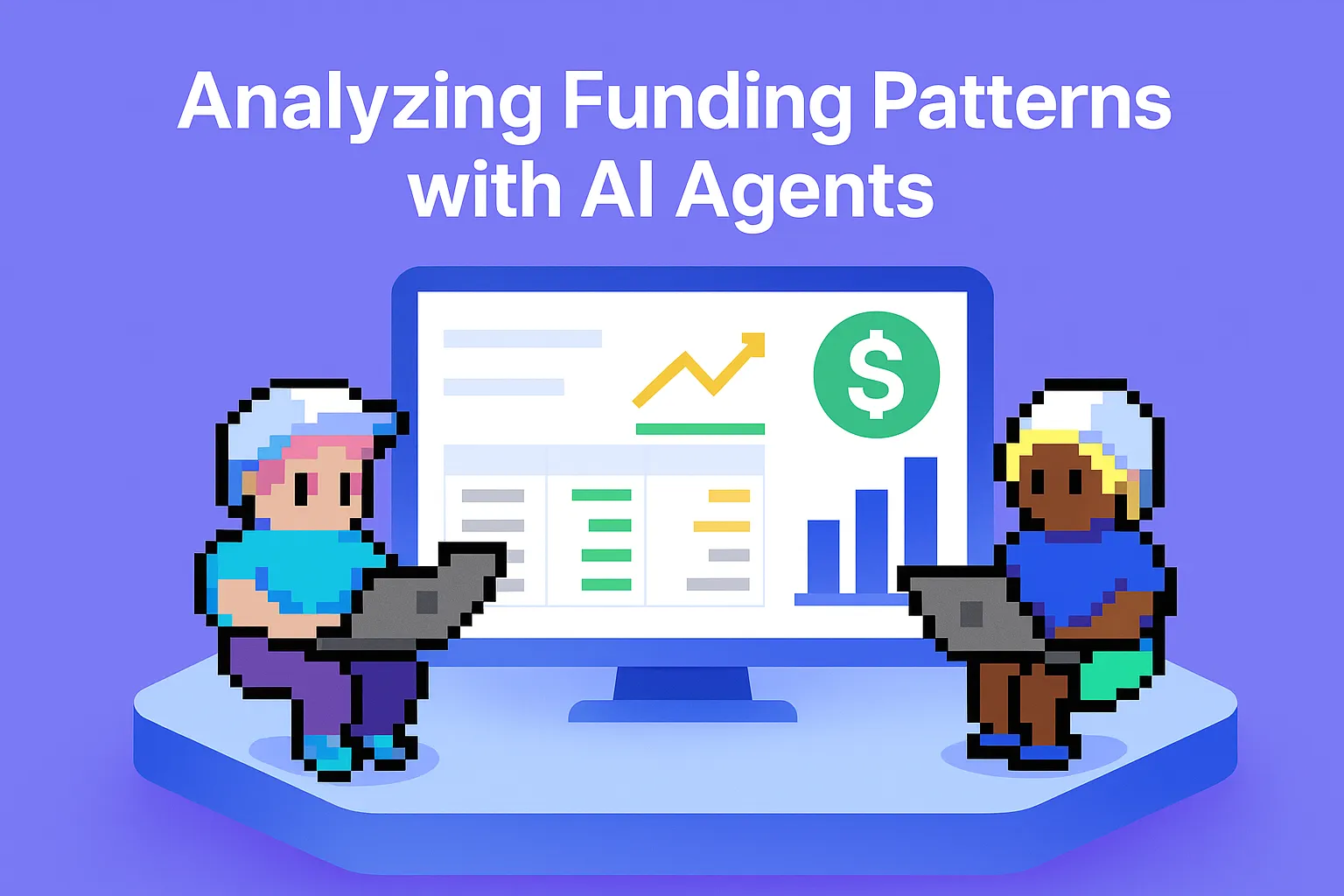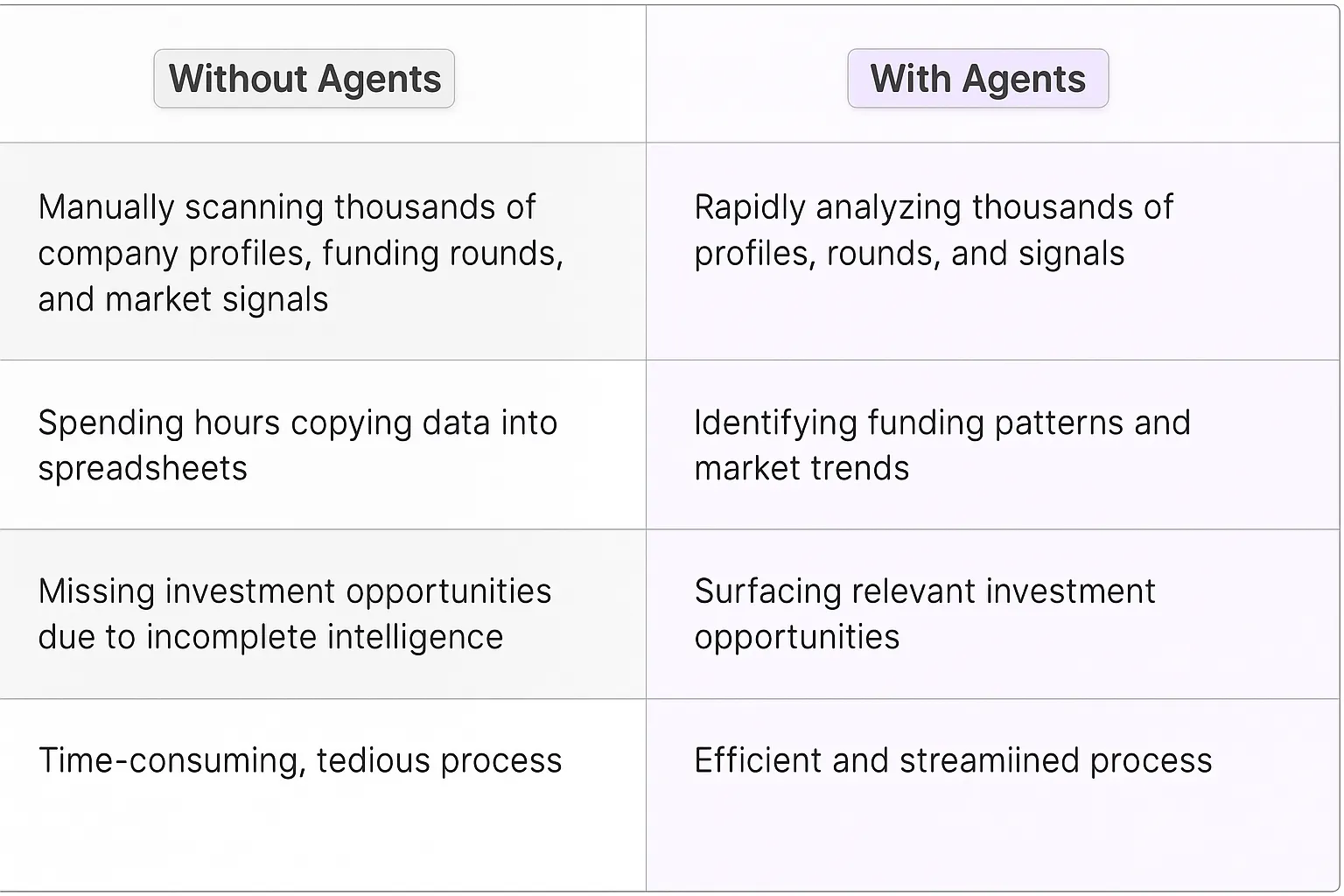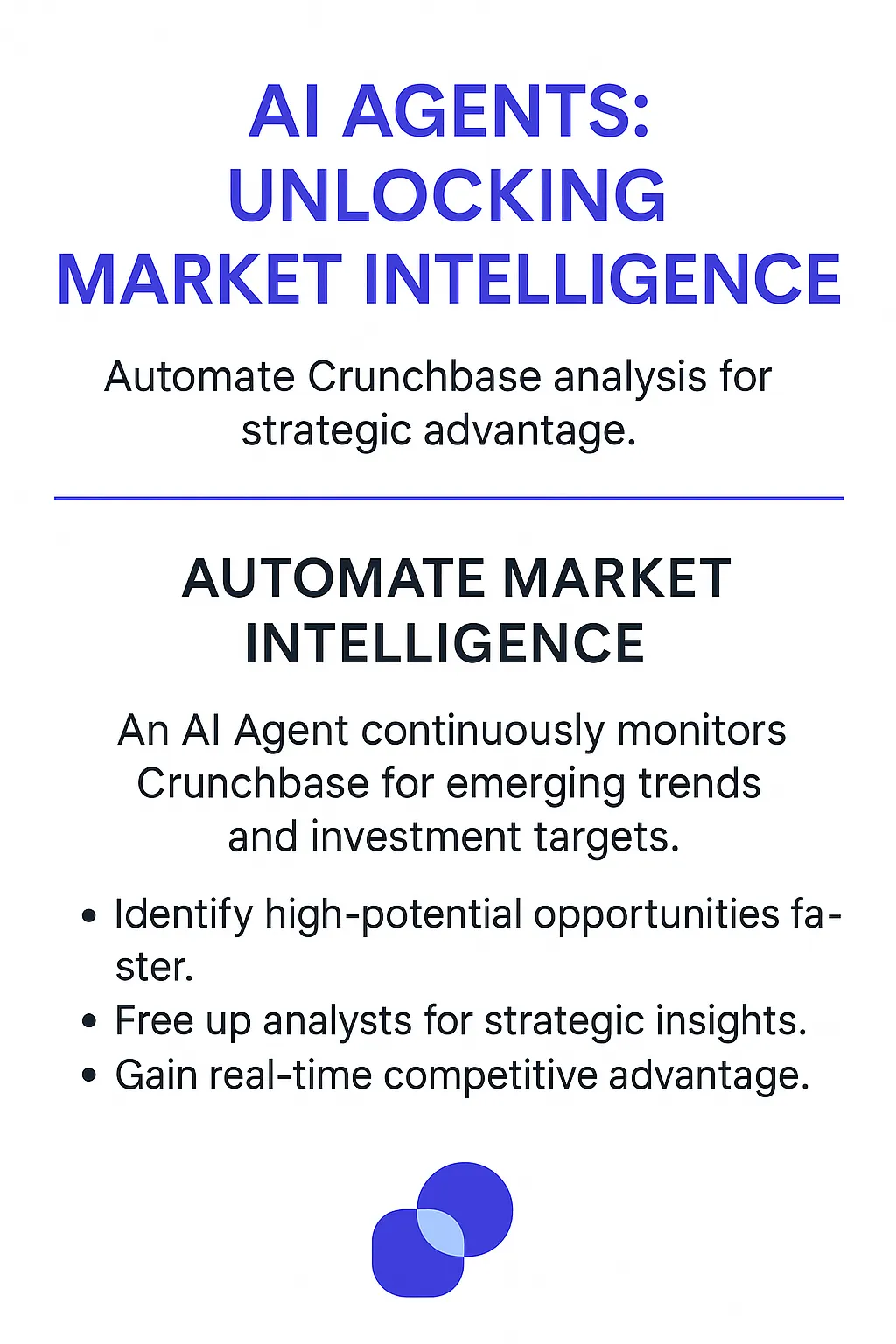Crunchbase
Understanding Crunchbase's Business Intelligence Platform
Crunchbase stands as the leading platform for discovering innovative companies and accessing detailed business information. The platform maintains a comprehensive database of startups, established companies, investors, and market activities. With over 75 million unique visitors annually, it serves as the go-to source for professionals seeking accurate company intelligence and funding data.
Key Features of Crunchbase
The platform excels in tracking funding rounds, acquisitions, and company milestones. Its robust dataset includes detailed company profiles, investment history, leadership teams, and market signals. Users can access real-time updates on company news, job listings, and industry trends. The platform's API enables programmatic access to this wealth of information, making it ideal for integration with AI agents.

Benefits of AI Agents for Crunchbase
What would have been used before AI Agents?
Traditional Crunchbase research required manual scanning through thousands of company profiles, funding rounds, and market signals. Analysts and investors spent countless hours clicking through profiles, copying data into spreadsheets, and trying to piece together patterns. The process was not only time-consuming but often resulted in missed opportunities and incomplete market intelligence.
What are the benefits of AI Agents?
AI Agents transform how teams extract value from Crunchbase's vast dataset of company and investment information. These digital teammates can rapidly analyze funding patterns, identify emerging market trends, and surface relevant investment opportunities based on specific criteria.
The network effects are particularly powerful - as more users leverage AI Agents to analyze Crunchbase data, the agents become increasingly adept at identifying subtle market signals and investment patterns. They can detect early-stage companies showing promising growth trajectories before they become obvious to the broader market.
For venture capital firms and investors, AI Agents function like specialized analysts working 24/7 to monitor deal flow, track competitor movements, and flag relevant opportunities. They can instantly generate comprehensive reports on specific market segments, complete with funding trends, key players, and emerging startups.
The real breakthrough comes from the agents' ability to synthesize multiple data points simultaneously - combining funding history, team backgrounds, product momentum, and market positioning to surface high-potential opportunities that human analysts might miss. This creates a significant competitive advantage for firms who effectively deploy these digital teammates.
Growth teams at startups can leverage these agents to identify potential investors by analyzing historical investment patterns and strategic fit. The agents can quickly build lists of relevant investors who have backed similar companies at comparable stages, dramatically accelerating the fundraising process.
Additionally, these AI agents excel at market intelligence gathering by processing vast amounts of data to uncover patterns and insights that would take human researchers weeks to compile.

Potential Use Cases of AI Agents with Crunchbase
Processes
- Market intelligence gathering by analyzing funding patterns across specific industries and geographic regions
- Building comprehensive competitor landscapes by tracking investment activities and company growth trajectories
- Identifying emerging market trends through analysis of startup formation and funding in new sectors
- Creating detailed investor mapping based on historical investment preferences and portfolio compositions
- Monitoring acquisition targets by tracking companies matching specific growth and funding criteria
Tasks
- Generating weekly funding round summaries for specific industries or regions
- Pulling detailed company profiles including funding history, key personnel, and acquisition data
- Creating targeted lists of potential investors based on previous investments in similar companies
- Analyzing growth metrics across peer companies to benchmark performance
- Tracking job listings and employee count changes to identify scaling companies
- Monitoring news mentions and press releases for specific companies or investors
- Building investor presentations with competitive analysis and market sizing data
- Identifying potential board members or advisors based on industry experience
- Analyzing successful exit patterns in specific market segments
- Creating founder background analysis for pattern matching in investment decisions
Growth Opportunities Through AI Integration
The integration of AI agents with Crunchbase's vast dataset creates powerful network effects. Each query builds upon the platform's deep understanding of market dynamics, funding patterns, and company trajectories. Digital teammates can process complex relationships between investors, companies, and markets that would take humans hours or days to analyze manually.
For venture capital firms and startups, this capability translates into rapid pattern recognition across successful companies, enabling better strategic decisions. Corporate development teams can identify acquisition targets with greater precision by analyzing growth signals across multiple dimensions. The real value emerges when these AI capabilities are combined with human strategic thinking to spot emerging opportunities before they become obvious to the broader market.
These AI agents are particularly effective at competitive intelligence and sales forecasting, providing organizations with the insights needed to stay ahead of market trends.

Industry Use Cases
The integration of AI agents with Crunchbase unlocks powerful new ways for different sectors to leverage startup and company intelligence. From venture capital firms conducting detailed market analysis to sales teams identifying emerging opportunities, these digital teammates transform how professionals interact with Crunchbase's vast dataset.
While traditional Crunchbase workflows often involve manual searching and data compilation, AI agents can rapidly process complex queries, surface hidden patterns, and deliver actionable insights. They excel at tasks like competitor tracking, investment trend analysis, and lead qualification - enabling teams to make faster, more informed decisions backed by comprehensive market intelligence.
The following industry examples demonstrate how organizations are combining AI capabilities with Crunchbase's extensive company and funding data to gain competitive advantages and identify opportunities that may have otherwise gone unnoticed. Each use case highlights specific workflows where AI agents dramatically improve speed, accuracy and depth of analysis.
Software Development Industry: Leveraging Crunchbase AI for Strategic Growth
Software development companies face intense competition when launching new products and expanding into adjacent markets. A Crunchbase AI agent becomes particularly valuable for product and engineering leaders who need to rapidly understand market dynamics and identify strategic opportunities.
The AI can analyze patterns across thousands of software companies to surface critical insights about:
- Which development tools and frameworks are gaining the most traction with engineers
- Where competing products are seeing the strongest user adoption and growth
- Which geographic markets show the highest concentration of potential customers
- What pricing models are resonating in different market segments
For example, a dev tools startup could ask the AI to analyze all companies building developer productivity tools that have raised Series A funding in the past 18 months. The AI would quickly identify common traits among the most successful raises - like specific technical approaches, go-to-market strategies, and customer profiles.
This type of analysis traditionally required weeks of manual research across multiple data sources. With an AI agent parsing Crunchbase's extensive dataset, software companies can now get these insights in minutes and make faster, more informed decisions about product roadmap and market expansion.
The real power comes from combining the AI's pattern recognition capabilities with Crunchbase's comprehensive data on funding rounds, acquisitions, and company growth trajectories. This allows software development teams to spot emerging opportunities before they become obvious to the broader market.
By leveraging comprehensive market research capabilities, these AI agents help software companies make data-driven decisions about their strategic direction and competitive positioning.
SaaS Industry: Using Crunchbase AI to Decode Growth Metrics and Market Fit
The SaaS landscape has evolved beyond simple growth metrics into a complex web of interconnected signals. Crunchbase AI agents excel at parsing through these signals to uncover the real drivers of successful SaaS companies.
Growth stage SaaS founders and operators can leverage the AI to decode critical patterns across:
- Customer acquisition cost (CAC) ratios across different market segments
- Revenue expansion patterns in specific verticals
- Optimal timing for geographic expansion based on market maturity
- Product-led growth metrics that correlate with successful fundraising
The network effects in SaaS are fascinating - when a company hits product-market fit, the growth curves often follow predictable patterns. A Crunchbase AI agent can analyze thousands of these growth trajectories to identify the leading indicators of success.
Take vertical SaaS companies targeting the healthcare sector. The AI can analyze every healthcare SaaS startup that reached $10M ARR in the past 3 years, revealing common threads in their go-to-market motions, pricing evolution, and expansion strategies.
Most compelling is the AI's ability to surface counter-intuitive insights. While conventional wisdom might suggest focusing on enterprise customers, the data often reveals that successful SaaS companies start with a specific customer segment that others overlooked. The AI can identify these hidden opportunities by analyzing funding patterns, customer testimonials, and market sizing data.
The combination of Crunchbase's deep dataset with AI pattern recognition creates a powerful tool for SaaS operators to validate assumptions and discover unconventional growth strategies that actually work in today's market.
Advanced customer segmentation capabilities enable these AI agents to identify the most promising market opportunities and customer profiles for SaaS companies.
Considerations & Challenges
Implementing Crunchbase AI agents requires careful planning and understanding of several key factors that can impact success. The complexity goes beyond simple integration - it touches data quality, user workflows, and organizational readiness.
Technical Considerations
Data quality stands as the foundation for effective Crunchbase AI agent performance. Organizations need clean, structured data feeds from their Crunchbase Enterprise accounts. API rate limits can bottleneck real-time data access, especially during high-usage periods. Teams should implement robust error handling and rate limiting mechanisms.
Integration with existing tech stacks demands careful architecture decisions. The AI agent needs to seamlessly connect with CRM systems, business intelligence tools, and internal databases while maintaining data consistency across platforms.
Operational Challenges
User adoption often becomes the make-or-break factor. Teams accustomed to manual Crunchbase research may resist changing their workflows. Creating clear standard operating procedures and providing hands-on training sessions helps smooth the transition.
Cost management requires ongoing attention. While Crunchbase AI agents can reduce manual research time, organizations need to monitor API usage, compute resources, and storage requirements. Setting up usage metrics and alerts helps prevent unexpected cost overruns.
Data Privacy & Compliance
Organizations must navigate complex data privacy requirements when implementing Crunchbase AI agents. This includes ensuring GDPR compliance for European market data and maintaining appropriate data retention policies. Teams should establish clear protocols for handling sensitive company information and maintaining audit trails of AI agent activities.
Performance Optimization
Regular monitoring and tuning of the AI agent's performance is crucial. This includes tracking response accuracy, processing times, and user satisfaction metrics. Teams should establish baseline KPIs and continuously refine the agent's capabilities based on user feedback and changing business needs.
AI-Powered Market Intelligence: The Future of Business Research
The marriage of AI agents with Crunchbase's extensive dataset marks a significant shift in how professionals conduct market research and identify opportunities. These digital teammates don't just automate existing workflows - they uncover insights and patterns that would be impossible to detect through traditional analysis. As organizations continue to integrate these capabilities, the competitive advantage will shift to those who can best combine AI-driven pattern recognition with human strategic thinking. The network effects of this integration will only grow stronger as more users leverage these tools, creating an increasingly sophisticated ecosystem for market intelligence and opportunity identification.
The integration of advanced business intelligence capabilities with Crunchbase's comprehensive dataset represents the next evolution in how organizations approach strategic decision-making and competitive analysis.













